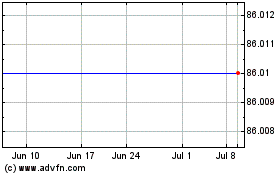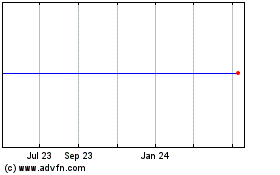United Tech Says Deals Will Pay Off -- WSJ
July 24 2019 - 3:02AM
Dow Jones News
By Thomas Gryta and Dave Sebastian
This article is being republished as part of our daily
reproduction of WSJ.com articles that also appeared in the U.S.
print edition of The Wall Street Journal (July 24, 2019).
United Technologies Corp. executives defended their deal making
and slightly raised the company's 2019 profit outlook on the
strength of its aerospace business.
The industrial conglomerate is pursuing a restructuring that
will split it into three companies by mid-2020. It also closed its
acquisition of aircraft-parts maker Rockwell Collins late last
year, and last month agreed to merge with defense contractor
Raytheon Co.
Activist investors have attacked the Raytheon deal, in
particular, saying United Technologies risks losing its focus. But
in an interview, finance chief Akhil Johri deflected the
criticism.
"Things are starting to come together," he said. "The
investments are paying off."
The Farmington, Conn.-based company also is dealing with
pressures from trade tensions, including higher U.S. tariffs on
inputs, and the grounding of Boeing Co.'s MAX jets . In the recent
quarter, the company said increased volume and pricing for some of
its products offset tariff costs.
United Technologies provides numerous parts for the Boeing
airplane and still expects an earnings reduction of as much as 10
cents a share for 2019 if production of the aircraft continues at
current rates, which Mr. Johri said is likely.
He said the new Collins Aerospace division and its aftermarket
business are benefiting from the grounding as airlines and
maintenance shops make sure they have plenty of spare parts to keep
their non-MAX fleet flying. For the MAX components Collins makes,
the company is relying on Boeing to lead the way, Mr. Johri
said.
"We are doing what Boeing tells us," he said. "We do things as
per their instructions."
United Technologies aimed to narrow its focus by splitting off
its Otis elevator and Carrier air-conditioner businesses. But since
the Raytheon deal was announced, activist investors Pershing Square
Capital Management and Third Point LLC have criticized the company
for branching out again.
"Yes, we understand some of our shareholders' concerns that it
dilutes in the near term," Mr. Johri said Tuesday. But for
long-term shareholders with a horizon of five years or more, he
said, "this deal would be something that people would be
supporting."
Short-term investors, he said, can expect the company to return
$18 billion to $20 billion in cash to shareholders over three
years, almost double what Raytheon and United Technologies as
separate companies could do in total.
Mr. Johri conceded it could take some time for investors to
appreciate the company's strategy. "It was a surprise," he said of
the decision to merge with Raytheon. "It took me a couple of months
to get my head around the benefits of this."
Chief Executive Greg Hayes said on a conference call Tuesday
that the Raytheon deal will give the new company "the scale to
compete anywhere" in the aerospace sector. He said the separation
of Otis and Carrier remains on track.
United Technologies reported a second-quarter profit of $1.9
billion, down from $2 billion a year earlier. Adjusted per-share
earnings of $2.20 exceeded the $2.05 consensus estimate from
analysts, according to Refinitiv. Revenue rose to $19.63 billion
from $16.7 billion.
The company projected 2019 adjusted earnings of $7.90 to $8.05 a
share, up from previous guidance of $7.80 to $8 a share. Its sales
expectations held at $75.5 billion to $77 billion.
Otis saw improvement in China, Mr. Johri said, but Carrier's
business grew more slowly than expected on weakness in the Middle
East, the Americas and Europe. He said broader economic pressure in
Europe is expected to hurt results across the entire business.
United Technologies now expects $600 million in savings from the
Collins deal this year, an increase of $100 million. The combined
company, valued at more than $100 billion after planned spinoffs,
would be the world's second-largest aerospace-and-defense company
by sales behind Boeing.
Write to Thomas Gryta at thomas.gryta@wsj.com
(END) Dow Jones Newswires
July 24, 2019 02:47 ET (06:47 GMT)
Copyright (c) 2019 Dow Jones & Company, Inc.
United Technologies (NYSE:UTX)
Historical Stock Chart
From Mar 2024 to Apr 2024

United Technologies (NYSE:UTX)
Historical Stock Chart
From Apr 2023 to Apr 2024
